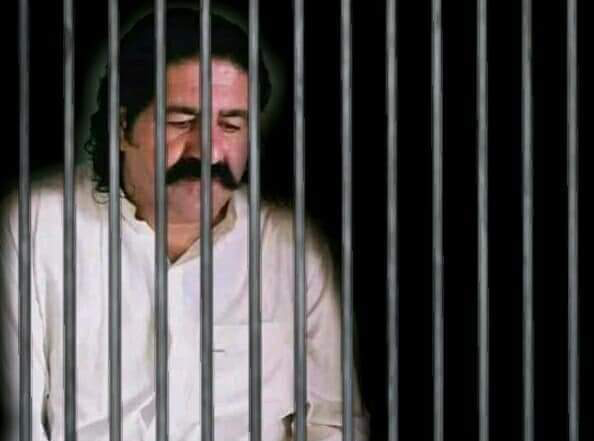One has lost count of how many times Pakistan’s former lawmaker, Ali Wazir, has been arrested or forcibly disappeared. Even when he was a member of the National Assembly, he was not spared from persistent targeting by the state. It is important to remember that Wazir has lost more than ten family members to terrorism due to conflicts imposed by the state upon his people repeatedly, for no purpose other than the enrichment of a few.
Despite the treatment he and his family members have endured from the state, Wazir chose to represent his people’s voice in Pakistan’s Parliament, even though the Pashtun Tahaffuz Movement (PTM), the civil rights movement with which he was affiliated at the time, opposes parliamentary politics. His presence in the Parliament meant that the way the state treated Wazir and the importance it attached to his voice and grievances could have gone a long way in healing decades of wounds inflicted on the people of his province by manufactured conflicts. It could also have helped build the trust of the people of Wazir’s constituency in the state institutions that are ostensibly made for the people, by the people. But the right to representation for the 150,000 voters of South Waziristan did not matter. The state decided to punish Wazir for exercising his right to freedom of expression. In doing so, it sent a clear message: that peaceful resistance against state oppression has no space. Worse still, it cemented the perception and grievance of the Pashtun people that Pakistan’s institutions, including its Parliament, have no real room for them or their voices.
When Wazir was arrested in December 2020, he was kept behind bars on around four different charges, despite being granted bail by the Supreme Court of Pakistan. He was eventually released two years and two months after his arrest. A few months after his release in February 2023, he was arrested once again in June of that year. He was released only to be re-arrested in a series of cases lodged against him from August to September 2023. While I had the great honor of being his co-accused in three of the cases lodged against him in Islamabad during that period, my gender and domicile made it difficult for our captors to continue my ordeal. However, Wazir continued to be arrested and re-arrested thereafter, facing charges in at least two other cases. Finally, when he was released, he had just a few months of freedom before being subjected to further detention—this time under the draconian Maintenance of Public Order (MPO), first issued in Rawalpindi and then in Gujrat. This cycle of new cases under the MPO began after he was arrested in August 2024 in connection with three different cases in Islamabad—accident, narcotics, and 7 ATA. The lack of outrage over Wazir’s prolonged incarceration reflects our national mindset, which believes that some lives are more worthy of respect and protection than others. This explains why Pakistan Tehreek-e-Insaf (PTI) workers in urban areas are arrested while PTM workers convening for their National Jirga in Khyber Pakhtunkhwa are met with straight fire, killing four and injuring many others. Again, impunity reigns.
“It is irrelevant who is in government in Pakistan; so long as power is wielded from behind the scenes, there is no space for people like Ali Wazir. He has the wrong domicile, which allows the state to imprison him on trumped-up terror charges.”
There was a similar disconnect between Islamabad and Khyber Pakhtunkhwa when many of Wazir’s family members were targeted by the Taliban. Islamabad was calling for military operations and narrative-building to justify Rawalpindi’s displacement, murder, and humiliation of the Pashtun people. It was deemed to be in the “greater national interest” and the “need of the hour” to root out terrorism “once and for all.” How many “once and for all”s there have been is now long forgotten. The military has played (and continues to play) the “good Taliban/bad Taliban” game, yet there is zero accountability for public money spent on a series of military operations in Khyber Pakhtunkhwa. Wazir has consistently, without any concern for personal consequences, raised his voice against this daylight robbery, the plunder, and the general ease with which the state has dehumanized the Pashtun people.
It is irrelevant who is in government in Pakistan; so long as power is wielded from behind the scenes, there is no space for people like Wazir. He has the wrong domicile, which allows the state to imprison him on trumped-up terror charges or under the MPO. No court can intervene, and no media will provide him with coverage. When he was in jail during his time as parliamentarian, successive speakers of the National Assembly forgot the term “Production Order.” Similarly, no court seems able to grasp the simple reality—that Wazir is neither a criminal nor a terrorist, and he is being punished solely for choosing not to compromise on his principles in the struggle for a life of dignity for the Pashtun people. For a country where there is no political consensus on basic issues of civilian supremacy and the rule of law, it is truly astounding how all political players appear to agree that Wazir must be permanently incarcerated. The courts where Wazir is presented—regardless of their location in the country—also seem to share the unanimous view that sham proceedings must continue. In this situation, more than “judicial reforms,” it appears that Pakistan is in desperate need of the complete dismantling of all its racist and unjust institutions that treat the liberty and dignity of the Pashtun people as disposable.
Condemned if they make it to Parliament. Condemned if they steer clear of parliamentary politics. Condemned if they cry. Condemned if they scream. Perpetually condemned for no reason other than the fact that they can be, because when has mainstream Pakistan ever shown collective compassion for the persecuted from the “peripheries”?

The writer is an Islamabad-based lawyer and human rights activist.

